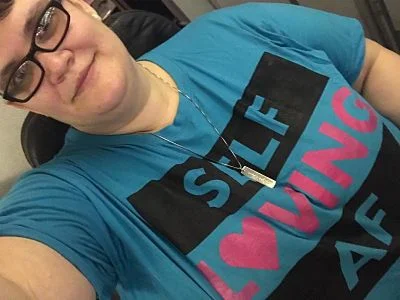I do not know if there is an in-patient eating disorder treatment center that currently exists that is safe for all people with non-dominant systemic identities at all levels of the organization. I do not know of an eating disorder treatment program for higher level of care where I as a fat, queer, non-binary person would feel safe to attend.
Read MoreWhile I physically ache at my dog’s absence, she gave me and my body the power to recognize belonging.
Read MoreThe dominant culture in our society favors those who are thin and dehumanizes those who are fat. We are constantly reminded of this on a daily basis. There is an entire 150 billion-dollar industry worldwide that exists because of faphobia and weight stigma. Add in approximately $3 billion for stomach amputation or stomach alteration surgery otherwise known as weight loss surgery globally. There is no escaping that people are afraid of fatness. Fatphobia: Fear of fat, fat people, and/or fatness.
Read MoreLast night the seat next to mine on my flight was empty. This morning it isn’t. I’m not rolling in the dough enough to purchase a second seat ahead of time and wait to get reimbursed. So, I am going to have to see if someone will be willing to switch seats with me at the last minute where there is an empty middle. You know how willing people are to give that up. [insert eye roll] This puts me at risk of getting kicked off the flight.
Read More
I did not always believe that fat people had a right to eat regularly and enough food, every day.
Nope. I had so much internalized fatphobia, weight stigma and bias that I very much bought into the idea that my fat body was a problem. A BIG problem.
Which meant that I shouldn't (read: didn't deserve to) eat regularly and enough food, every day.
It was impossible for me to feel much joy or pleasure, take up space, or gasp. . .feel sexy.
Read MoreIt was easy to know in high school when I was starving myself, using laxatives not as prescribed, and making myself throw up that I most likely had an eating disorder. This was the way I saw them represented in after school specials, and documentaries in health class. Though when I started seeing a therapist at 16, I was never told I had an eating disorder. I was never offered eating disorder treatment.
Read MorePart one kicks off the series with Claudette Largess, MA, writing about her love for Julia Louis Dreyfus, Seinfeld, and her experience writing her dissertation on Fat Acceptance. The series continues with part two where Sarah Thompson writes about her experience in the Health at Every Size® Therapists and Nutritionists Facebook Group. Finally, the series will wrap up with part 3 where Rachel Millner, PsyD., writes a letter to her friends and colleagues in larger bodies.
Read MoreIt was easier to put up with my chronic foot pain, than to deal with a new specialist who might stigmatize my body and receive substandard care.
Read MoreThere were many things that influenced my willingness to seek information about treatment for ADHD. But I was finally willing to seek out this kind of help.
Read MoreThis is what I learned growing up. I've continued to hear this throughout my life. As recently as a few months ago, I was in a training where the trainer used the word fat as slur in an example she gave. When I asked her about it later, she said she used it as an example (without thinking about its effect on me), because it's the worst thing you can call someone.
Read More








